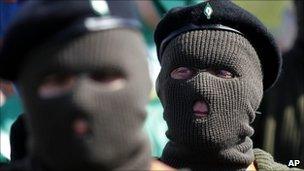Real IRA: Will NI dissident threat ever go away?
- Published

Recent Irish history suggests militant republicans eventually sit down at the negotiating table
The Real IRA - and other dissident republican groups - are more interested in killing than negotiating.
They seem determined to cause as much disruption as possible during the ongoing Northern Ireland Assembly election campaign, and next month's first visit to the Republic of Ireland by the Queen.
In spite of the pleas from priests and politicians to stop, the violence will continue.
The graveyard statement in Londonderry, by a masked Real IRA man, showed their intent.
However, in truth, it did not tell the police anything they did not know already.
In Belfast and Dublin, police chiefs have known for some time the danger posed by groups like Óglaigh na hÉireann, the Real IRA and the Continuity IRA. The threat is severe, but the authorities believe they have the resources to deal with it.
Cross-border police co-operation is better now than at any point in Northern Ireland's 90-year history.
The Queen's four-day visit to Ireland will go ahead as planned on 17 May.
The Assembly election will take place, as scheduled, on 5 May.
The foundations of the peace process remain firm, in spite of the dissident threat.
Nonetheless, the sight of 250 people in Derry applauding a masked man who had just threatened to kill police officers will cause some alarm.
It was only a tiny fraction of Derry's 100,000-strong population, but the Real IRA is not the only dissident group, and Derry is not the only place they have a presence.
Recent Irish history suggests militant republicans eventually sit down at the negotiating table. After killing 1,771 people in a three-decade campaign, the Provisional IRA finally called a permanent ceasefire in 1997.
So what is the price of negotiations with the dissidents?
The masked Real IRA man in Derry denied that private talks had started already with secret go-betweens.
He said: "We wish to state clearly and unequivocally that the leadership of the IRA is not in any negotiations with the British government, Free State government (Ireland) or anyone that represents them.
"If the British are serious about discussing the restoration of Irish sovereignty then we will listen to their proposals.
"Anything else is a waste of time."
'Out of step'
Unlike the Provisional IRA, the dissidents do not have an elected political wing like Sinn Fein.
The outgoing 108-member Stormont Assembly does not have any dissident representatives, and neither does the 166-seat Irish Parliament.
All the key institutions in Irish society are vehemently opposed to the dissidents - including the Catholic Church and the Gaelic Athletic Association (GAA).
Given this, it is difficult to see how support for the dissidents is going to grow radically in the coming months and years.
At the same time, it is hard to imagine the threat going away.
There is a small group of fanatics determined to bomb and shoot, led by experienced former IRA members with dozens of young, unemployed hot-heads willing to cause death and destruction.
The Queen will be well protected when she flies into Dublin in three weeks' time. There will be dissident republican protests and they will be loud - but they will be relatively small.
What the police fear most is not an attempted attack on the Queen in Dublin, but a bombing or shooting in Northern Ireland while she is there, to try to steal the headlines.
The royal visit will show that the peace process has matured, and that Britain and Ireland are now good neighbours rather than sworn enemies.
This is the new normality in Ireland. Dissidents want to break it.
They are out of step with the Irish people, north and south of the border. But their attitude seems to be: no-one likes us, we don't care.
- Published26 April 2011
- Published25 April 2011
- Published24 April 2011
- Published27 December 2010
- Published5 October 2010